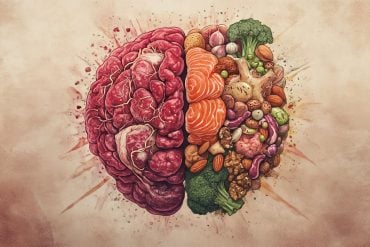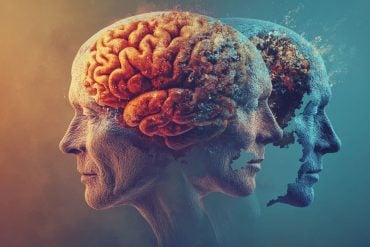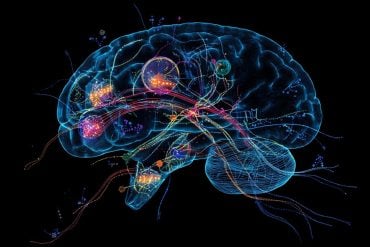Summary: When mental and physical tasks are put in direct competition, cognition tends to win out. Researchers suggest more energy is directed to the brain than the body, supporting the ‘selfish brain’ theory of evolution.
Source: University of Cambridge.
New research on our internal trade-off when physical and mental performance are put in direct competition has found that cognition takes less of a hit, suggesting more energy is diverted to the brain than body muscle. Researchers say the findings support the ‘selfish brain’ theory of human evolution.
Human brains are expensive – metabolically speaking. It takes lot of energy to run our sophisticated grey matter, and that comes at an evolutionary cost.
Now, a new investigation into the immediate trade-off that occurs inside us when we have to think fast and work hard at the same time is the first to demonstrate that – while both are impaired – our mental ability is less affected than our physical capacity.
Researchers say that the findings suggest a “preferential allocation of glucose to the brain”, which they argue is likely to be an evolved trait – as prioritising quick thinking over fast moving, for example, may have helped our species survive and thrive.
Scientists from the University of Cambridge’s PAVE (Phenotypic Adaptability, Variation and Evolution) research group tested 62 male students drawn from the University’s elite rowing crews. The participants had an average age of 21.
The rowers performed two separate tasks: one memory, a three minute word recall test, and one physical, a three minute power test on a rowing machine.
They then performed both tasks at once, with individual scores compared to those from previous tests. As expected, the challenge of rowing and remembering at the same time reduced both physical and mental performance.
However, the research team found that change in recall was significantly less than the change in power output.
During the simultaneous challenge, recall fell by an average of 9.7%, while power fell by an average of 12.6%. Across all participants the drop in physical power was on average 29.8% greater than drop in cognitive function.
The team say the results of their new study, published today in the journal Scientific Reports, add evidence to the ‘selfish brain’ hypothesis: that the brain has evolved to prioritise its own energy needs over those of peripheral organs, such as skeletal muscle.
“A well-fuelled brain may have offered us better survival odds than well-fuelled muscles when facing an environmental challenge,” said Dr Danny Longman, the study’s lead author from the PAVE team in Cambridge’s Department of Archaeology.
“The development of an enlarged and elaborated brain is considered a defining characteristic of human evolution, but one that has come as a result of trade-offs.
“At the evolutionary level, our brains have arguably cost us decreased investment in muscle as well as a shrunken digestive system.
“Developmentally, human babies have more stored fat than other mammals, acting as an energy buffer that feeds our high cerebral requirements.
“On an acute level, we have now demonstrated that when humans simultaneously experience extremes of physical and mental exertion, our internal trade-off preserves cognitive function as the body’s priority.”
The adult brain derives its energy almost exclusively from the metabolism of glucose. Yet skeletal muscle mass is also energetically expensive tissue, accounting for 20% of the human male ‘basal metabolic rate’ – the energy used when doing nothing.
Longman says a limited supply of blood glucose and oxygen means that, when active, skeletal muscle becomes a “powerful competitor” to the brain. “This is the potential mechanism for the fast-acting trade-off in brain and muscle function we see in just a three minute window.”

“Trade-offs between organs and tissues allow many organisms to endure conditions of energy deficit through internal prioritising. However, this comes at a cost,” said Longman.
He points to examples of this trade-off in humans benefiting the brain. “The selfish nature of the brain has been observed in the unique preservation of brain mass as bodies waste away in people suffering from long-term malnutrition or starvation, as well as in children born with growth restriction.”
The study
Protocol A – isolated power test:
Participants rowed at maximal effort for 3 minutes, and their average Wattage was recorded.
Protocol B – isolated recall test:
Participants performed a free recall word task in which they were shown 75 words from the Toronto Word Pool for a 3 minute period. They then had 5 minutes to recall and write as many words as possible. The number of words correctly recalled during a given time period was recorded.
Protocol C – combined ‘trade-off’ test:
Participants did both (but with a different word set), and their average Wattage and number of words correctly recalled was recorded. Researchers used ‘paired samples t-tests’ to compare power output between Protocols A and C, and for comparing free recall in Protocols B and C. They then compared the two differences, and found that the percentage change in free recall was significantly less than the percentage change in power output – an average of 29.8%.
Source: Fred Lewsey – University of Cambridge
Publisher: Content organized by NeuroscienceNews.com.
Image Source: NeuroscienceNews.com image is credited to Danny Longman.
Original Research: Full open access research for “A trade-off between cognitive and physical performance, with relative preservation of brain function” by Daniel Longman, Jay T. Stock & Jonathan C. K. Wells in Scientific Reports. Published online October 20 2017 doi:10.1038/s41598-017-14186-2
[cbtabs][cbtab title=”MLA”]University of Cambridge “‘Selfish Brain’ Wins Out When Competing With Muscle Power.” NeuroscienceNews. NeuroscienceNews, 20 October 2017.
<https://neurosciencenews.com/brain-muscle-power-7781/>.[/cbtab][cbtab title=”APA”]University of Cambridge (2017, October 20). ‘Selfish Brain’ Wins Out When Competing With Muscle Power. NeuroscienceNews. Retrieved October 20, 2017 from https://neurosciencenews.com/brain-muscle-power-7781/[/cbtab][cbtab title=”Chicago”]University of Cambridge “‘Selfish Brain’ Wins Out When Competing With Muscle Power.” https://neurosciencenews.com/brain-muscle-power-7781/ (accessed October 20, 2017).[/cbtab][/cbtabs]
Abstract
A trade-off between cognitive and physical performance, with relative preservation of brain function
Debate surrounds the issue of how the large, metabolically expensive brains of Homo sapiens can be energetically afforded. At the evolutionary level, decreased investment in muscularity, adiposity and the digestive tract allow for a larger brain. Developmentally, high neo-natal adiposity and preferential distribution of resources to the brain provide an energetic buffer during times of environmental stress. Through an experimental design, we investigated the hypothesis of a trade-off involving brain and muscle at the acute level in humans. Mental performance was measured by a free-recall test, and physical performance by power output on an indoor rowing ergometer. Sixty-two male student rowers performed the two tests in isolation, and then again simultaneously. Paired samples t-tests revealed that both power output and mental performance reduced when tested together compared to in isolation (t(61) = 9.699, p < 0.001 and t(61) = 8.975, p < 0.001). Furthermore, the decrease in physical performance was greater than the decrease in mental performance (t(61) = −2.069, p = 0.043). This is the first investigation to demonstrate an acute level trade-off between these two functions, and provides support for the selfish brain hypothesis due to the relative preservation of cognitive function over physical power output. The underlying mechanism is unclear, and requires further work.
“A trade-off between cognitive and physical performance, with relative preservation of brain function” by Daniel Longman, Jay T. Stock & Jonathan C. K. Wells in Scientific Reports. Published online October 20 2017 doi:10.1038/s41598-017-14186-2






